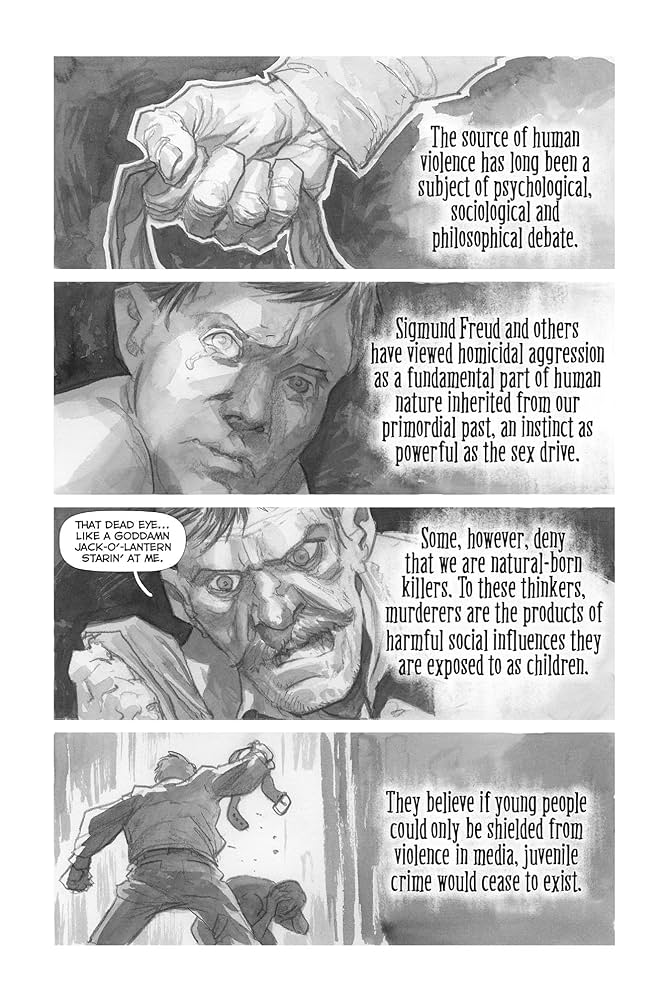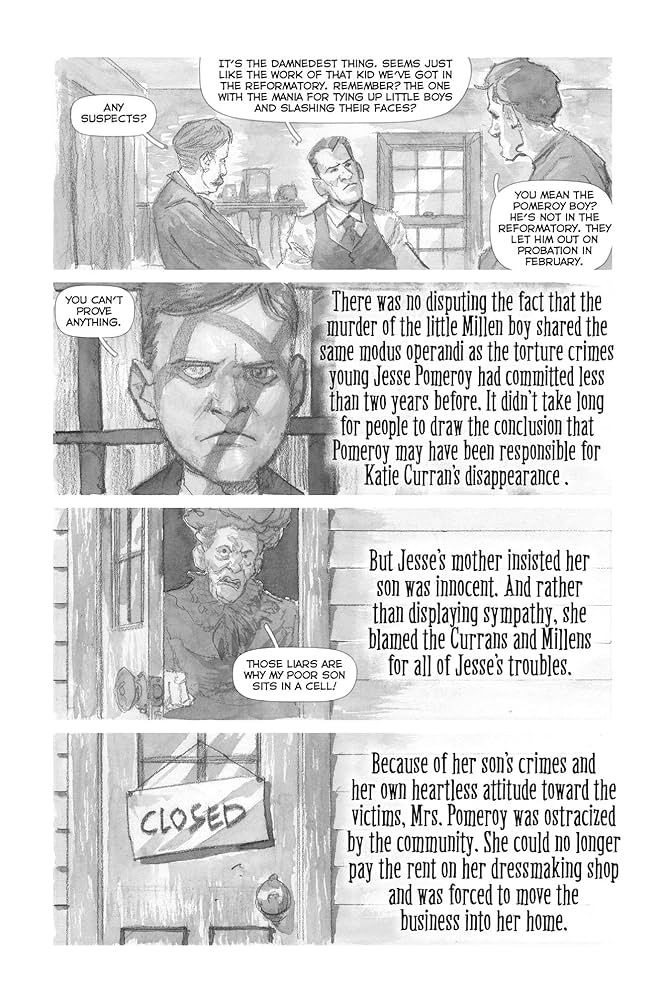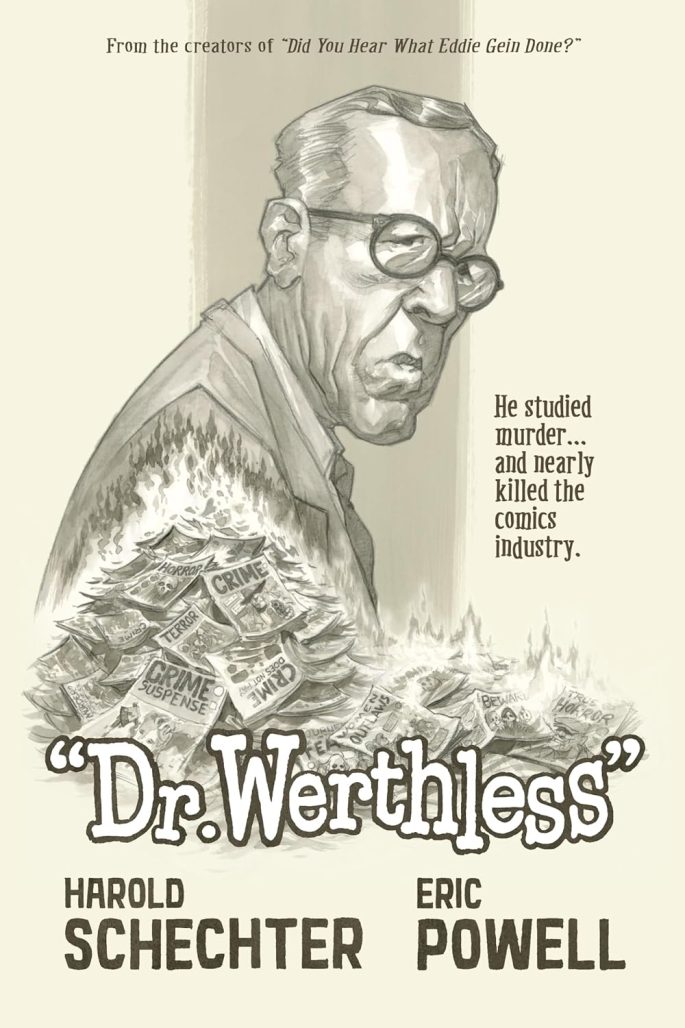 Dr. Werthless
Dr. Werthless
Writers: Harold Schechter and Eric Powell
Artist: Eric Powell
Publisher: Dark Horse Comics
Dr. Fredric Wertham nearly killed the American comics industry with a simple idea: indecent and violent entertainment can make children turn to delinquency. Superman upheld truth and justice, sure, but he did so by punishing criminals with violence. This means kids will go out into the schoolyard and beat their bullies senseless, a first step towards greater criminal activity. By that same principle, horror comics would make murderers and sexual deviants out of children because of their ghoulish and “tasteless” content. With these arguments in place in an America going through both a juvenile delinquency scare and a Red scare, Wertham laid the foundations for what would eventually become the Comics Code Authority, a censorship mechanism that would strip comics of their “immorality.” Many of these views were further developed in his 1954 book Seduction of the Innocent, a book that would change comics forever.
Upon news that Eric Powell and Harold Schechter, the team behind the excellent Did You Hear What Eddie Gein Done? (about the serial killer that targeted women and made furniture out of human parts), would be tackling this problematic giant in a book called Dr. Werthless, it was a safe bet to consider that they’d go hard at the dangers of moral crusaders looking for scapegoats in popular culture. While there’s some of that in there, it’s not a free-for-all on the controversial doctor. Quite the contrary. It’s a book about good and bad and how one can carve a dark path to the other despite the nobility of their intentions, legacy be damned.
Dr. Werthless approaches Wertham with a clear end goal, which is to explain how he became the man that gave comics its closest brush with cultural death. It’s similar in structure to the team’s Ed Gein book, where the intention isn’t just biography. Powell and Schechter have key targets they want to meet, and so they point the story towards them. For Gein it was about narrating the events that led to the creation of the Butcher of Plainfield. For Wertham it’s about how he became the boogeyman of comics. But there’s something more with Wertham, and it gets the treatment it deserves.


Powell and Schechter present us with not just one Wertham but several. First, we get an early look at the doctor that stumbles upon his own ego and his need for validation at every turn in the field of psychiatry. This part reads like a true crime story (not surprising given Schechter’s background), where he meets and studies serial killer Albert Fish and other mentally ill murderers. From there we jump to his studies on social environments and how black children develop lasting psychological problems due to segregation, poverty, and racism (a cause he kept close to his heart to the point of treating black patients in Harlem for twenty-five cents a session). And finally, we reach the comics crusade and how it all ties together to his past work.
Throughout these phases, we’re invited to embrace the complexity of the man to consider whether his impact on comics should be the thing we remember him by. It’s a tightly balanced exercise in non-fiction storytelling that is careful not to do the thinking for the reader. Powell and Schechter paint a man obsessed with his standing among his peers only to seamlessly transition to the time he became a champion of Civil Rights (by offering testimony in crucial court cases regarding school segregation) to then show how he succumbed to the best and worst parts of himself. It puts into question whether the good can outweigh the bad, and whether the negative should dictate the course of the entire narrative.
Powell captures all three Werthams with the care each one requires. A master of facial expressions, he lays bare the contradictory and conflicted psychology of the doctor to account for each phase. It humanizes him, but also reminds readers that to consider the human means accepting his unique ability to be just as much an incredible force for good as one for bad, all in one lifetime. In this sense, Powell and Schechter have essentially developed a sobering study of human imperfection.
Schechter’s attention to detail is exhaustive and deeply insightful, though it can get wordy. There are pages where Powell barely has any space to draw in. That said, it’s hard to find something to cut from it. In less than 200 comics pages, he manages to tell Wertham’s origin story, explore some of America’s most gruesome encounters with violence, and offer a crash course on the history of American comics and the role EC Comics played in it. You’ll learn, you’ll be horrified, and you’ll feel the indignation so many comics fans and creators of the time felt when they came under the crosshairs of persecution and fear thanks to the opinions Wertham shared across all media available to him.


Had Wertham’s story ended with his work on the effects that living conditions had on children of color and how his findings helped pro-Civil Rights cases, then we’d probably remember the doctor as an important contributor to the fight against school segregation. We’d more openly discuss his reputation for being a compassionate doctor that showed empathy to all his patients, with some of the country’s most terrifying and psychologically complex killers among them. But good intentions are not a guarantee of actual good. His comic book crusade would end up shaping his legacy, opportunistic and obsessive as it was. Powell and Schechter make this point crystal clear, offering a portrayal of a man that shows just how easy one can go from valuable to worthless in the grand scheme of things.
Dr. Werthless is out now
Read more great reviews from The Beat!

 Dr. Werthless
Dr. Werthless